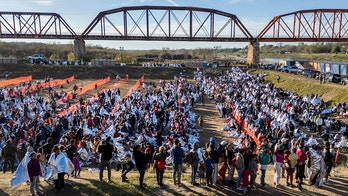Dick Cheney dead at 84
Former Vice President Dick Cheney died at 84 surrounded by his family following complications from pneumonia and cardiac and vascular disease.
Former U.S. Vice President Richard Cheney, who went from the plains of Casper, Wyoming to a decades-long public career as a Republican congressman, Defense secretary, White House chief of staff and one of the most powerful American vice presidents ever, has died at age 84, his family announced Tuesday.
"Richard B. Cheney, the 46th Vice President of the United States, died last night, November 3, 2025. He was 84 years old. His beloved wife of 61 years, Lynne, his daughters, Liz and Mary, and other family members were with him as he passed," his family said in a statement obtained by Fox News. "The former Vice President died due to complications of pneumonia and cardiac and vascular disease."
"For decades, Dick Cheney served our nation, including as White House Chief of Staff, Wyoming’s Congressman, Secretary of Defense, and Vice President of the United States," the statement continued.
"Dick Cheney was a great and good man who taught his children and grandchildren to love our country, and to live lives of courage, honor, love, kindness, and fly fishing," his family said. "We are grateful beyond measure for all Dick Cheney did for our country. And we are blessed beyond measure to have loved and been loved by this noble giant of a man."
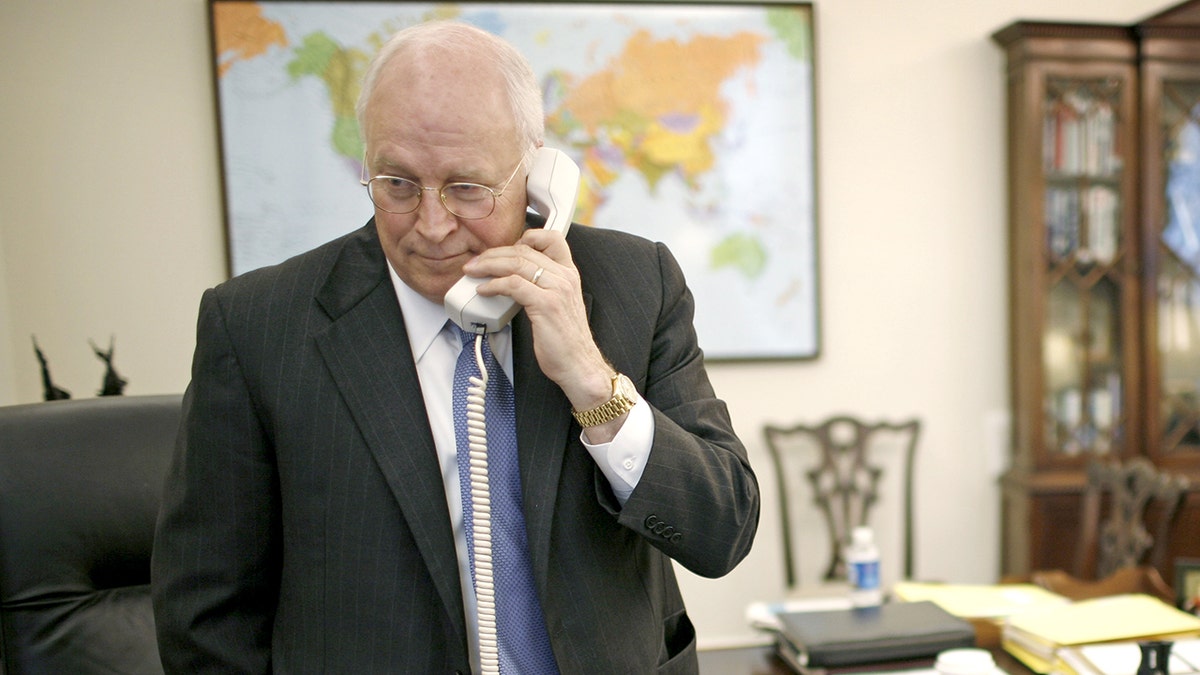
Vice President Dick Cheney in his West Wing office at the White House, Jan. 25, 2007, in Washington, D.C. (Charles Ommanney/Getty Images)
Cheney had a long history of cardiac problems, including five heart attacks. He received a heart transplant on March 24, 2012, at a Virginia hospital after nearly 21 months on a waiting list.
Cheney, who served as vice president for two terms under President George W. Bush, was one of the most powerful and controversial men ever to hold that position. He was a driving force behind America’s "war on terror," including the wars in Iraq and Afghanistan, and also known for his penchant for secrecy. A hero to hawkish conservatives, he was a villain to liberals and Democrats. Hillary Clinton once compared him to Darth Vader.
In the wake of the Sept. 11, 2001, terrorist attacks, he never expressed doubt about his support for indefinite detention for alleged terrorist prisoners or even about waterboarding.
"I feel very good about what we did," he told Fox News in 2008. "If I was faced with those circumstances again, I’d do exactly the same thing."
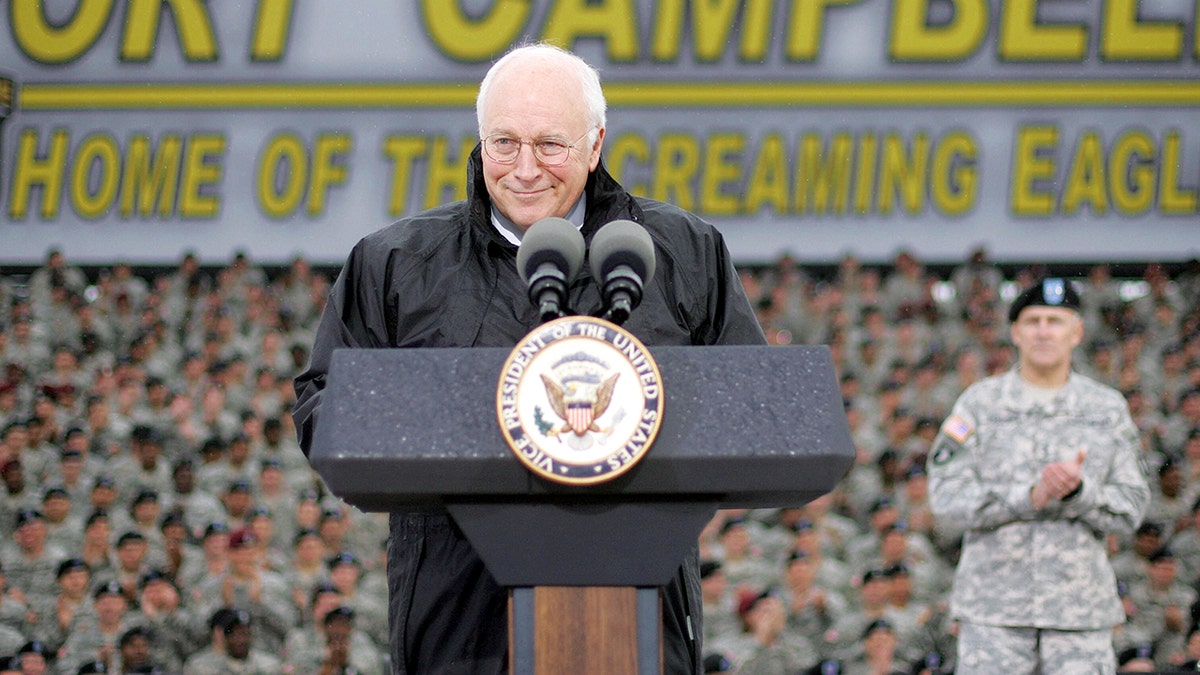
Vice President Dick Cheney makes remarks to 4,000 Army soldiers of the 101st Airborne Division returning from duty in Iraq during a "Welcome Home Rally," Oct. 16, 2006, at Fort Campbell, Kentucky. (TIM SLOAN/AFP via Getty Images)
In May 2011, after the death of Usama bin Laden, Cheney called it a "very good day" for the U.S. but warned the country was "still at war" with terrorists and should not "let down our vigilance."
After the election of Democratic President Barack Obama in 2008, Cheney, still a face of his party, became one of the new president’s most prominent critics, attacking his foreign policy and accusing him of being soft on terrorism.
Cheney also actively promoted expanding the powers of the presidency. In August 2011, he released a memoir, "In My Time."
In addition to his decades-long political career, Cheney also worked in the oil industry as chairman and chief executive officer of the Halliburton Company, from 1995 until he returned to politics in 2000.
A son of the American West, Richard Bruce Cheney was born January 30, 1941, in Lincoln, Nebraska, and grew up in Casper, Wyoming, where he was captain of his high school football team and his future wife was a cheerleader. He received undergraduate and graduate degrees from the University of Wyoming.
In 1968, he moved to Washington as a congressional fellow and in 1969 became a staff assistant in the Richard Nixon administration. From 1975 to 1977, he served as chief of staff for Gerald Ford, Nixon's successor.
BUSH'S WAR ON TERROR VS TRUMP'S IRAN APPROACH: HOW US MIDDLE EAST STRATEGY EVOLVED
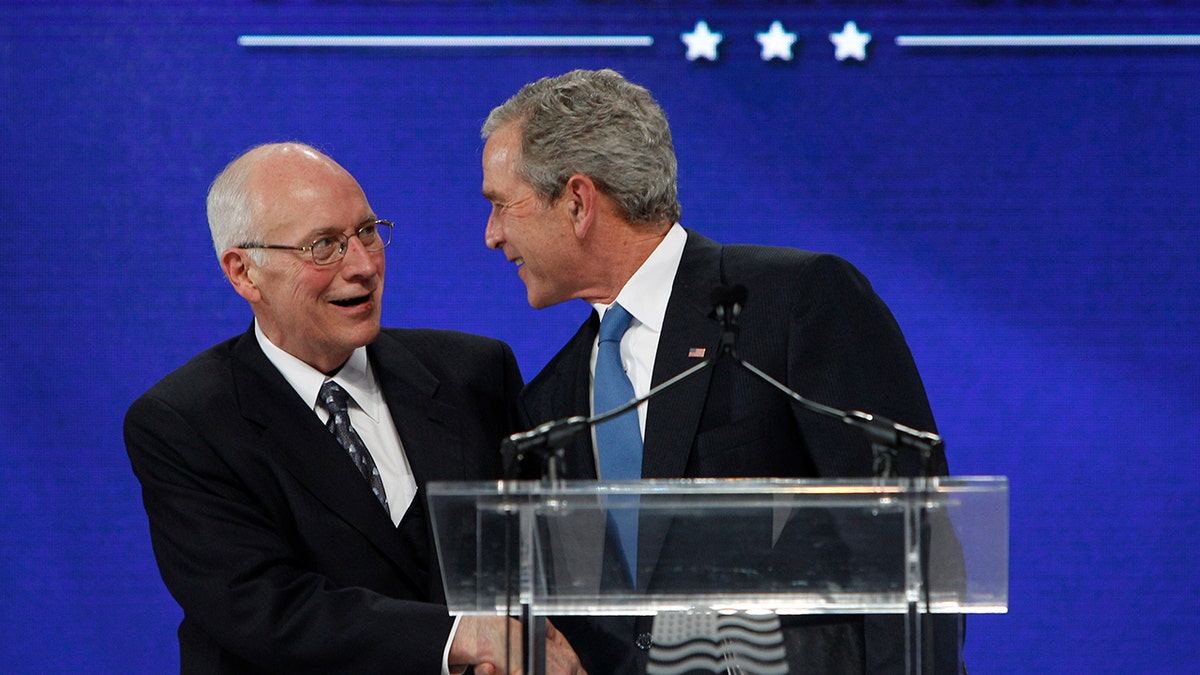
Former President George W. Bush, right, shakes hands with former Vice President Dick Cheney after Cheney introduced Bush during the groundbreaking ceremony for the President George W. Bush Presidential Center in Dallas, Tuesday, Nov. 16, 2010. (AP Photo/LM Otero, file)
In 1978, he was elected to the House of Representatives from Wyoming and served six two-year terms, rising to become minority whip. Cheney was popular in Congress, noted for his integrity and civility.
He next became Secretary of Defense under President George H. W. Bush, with the Senate confirming him unanimously, and served in this role from 1989 to 1993.
After Bush failed to win re-election, Cheney went to the American Enterprise Institute, a conservative think tank, and then to Halliburton.
He was elected vice president in 2000 and 2004 on the ticket with George W. Bush and flourished as one of Bush’s inner circle of advisers on defense and foreign policy.
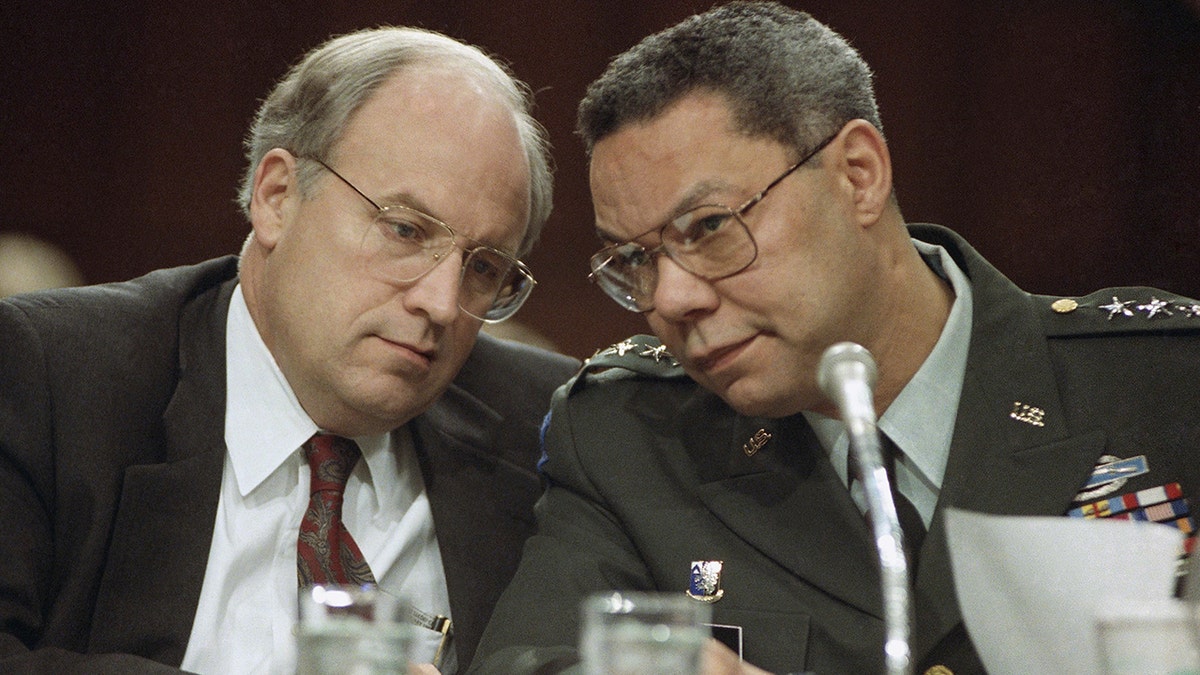
Secretary of Defense Dick Cheney, left, and Chairman of the Joint Chiefs, Gen. Colin Powell, huddle prior to testifying before the Senate Armed Services Committee, on Thursday, Feb. 21, 1991, on Capitol Hill in Washington. (AP Photo/John Duricka, file)
In a statement Tuesday, Bush said that Cheney’s death was "a loss to the nation" and said that Cheney was "the one I needed" when he became his running mate in 2000.
"Laura and I will remember Dick Cheney for the decent, honorable man that he was," Bush said in a statement obtained by Fox News. Cheney's death was announced Tuesday morning.
"History will remember him as among the finest public servants of his generation — a patriot who brought integrity, high intelligence and seriousness of purpose to every position he held," Bush's statement reads, in part.
Former Secretary of State Condoleezza Rice said she admired Cheney for "his integrity and his love of our country."
"I am grateful that I had the chance to serve with him twice — when he was secretary of defense for President George H.W. Bush at the end of the Cold War, a triumphant time for America and its values, and then when, as vice president, he helped chart a course to protect America after the dark days of 9/11," Rice wrote on X.
Rice called Cheney "an inspiring presence and mentor" who taught her "a great deal about public service."
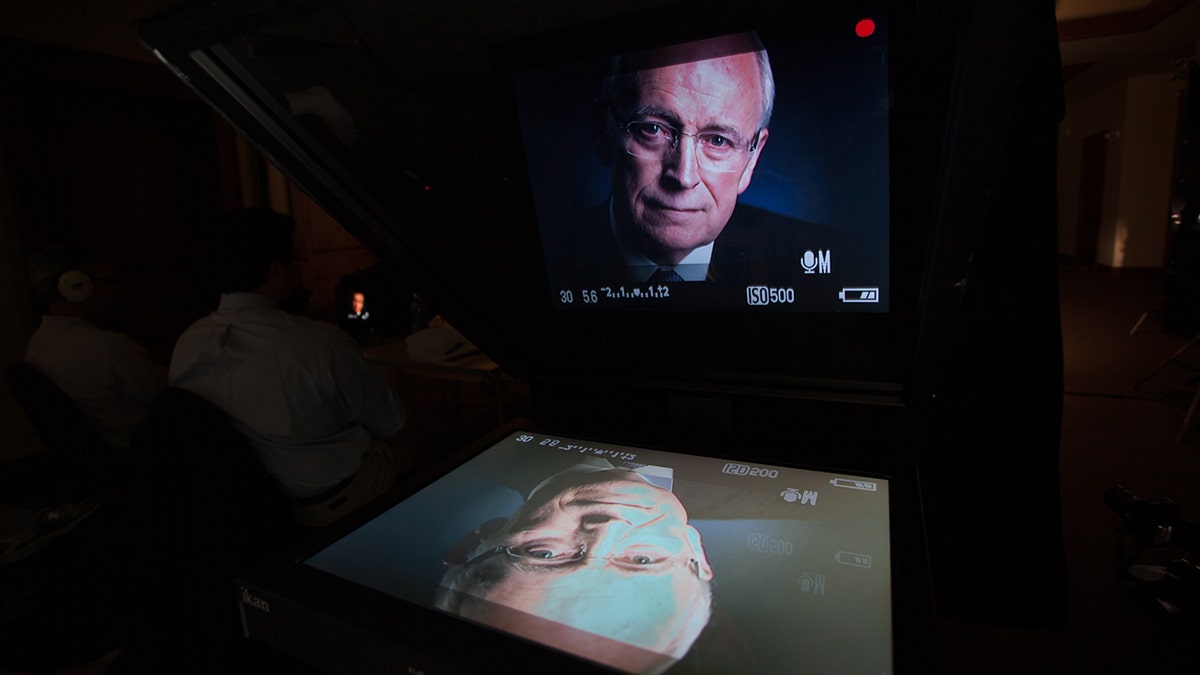
Former Vice President Dick Cheney is interviewed for 'The Presidents' Gatekeepers' project about the White House Chiefs of Staff, July 15, 2011, in Jackson, Wyoming. Cheney also served as the White House Chief of Staff under President Gerald Ford and the Secretary of Defense under President George H.W. Bush. (David Hume Kennerly/Getty Images)
Former President Bill Clinton said Cheney’s long public career was defined by conviction and duty.
"Throughout his long career in public service, Dick Cheney was guided by a deep belief that he was doing what was right for America," Clinton wrote on X. "Though we often disagreed, I always respected his dedication to our country and his unwavering sense of duty. My thoughts are with Lynne and the Cheney family."
Former Texas Gov. Jeb Bush also offered his condolences.
"RIP Vice President Cheney. A wonderful person and a great patriot," Jeb Bush wrote on X.
CLICK HERE TO GET THE FOX NEWS APP
Meanwhile, Former Vice President Mike Pence expressed condolences to Cheney’s family, calling him "a truly good and great man."
"Throughout his long career, he was an American patriot who championed the men and women in our armed forces and the importance of maintaining a strong national defense for America’s security at home and abroad," Pence said. "Karen and I will always be grateful for Vice President Cheney’s service and his personal kindness during our time in office."
Sen. Rick Scott, R-Fla., said that Cheney "dedicated his life to serving our nation."
"He was known for his love of his family and his country," Scott said in a post on X. "Ann and I are praying for the Cheney family and all who knew him during this time."
Cheney is survived by Lynne Vincent, two daughters, Elizabeth and Mary, and seven grandchildren.
Fox News' Patrick Ward contributed to this report.













































